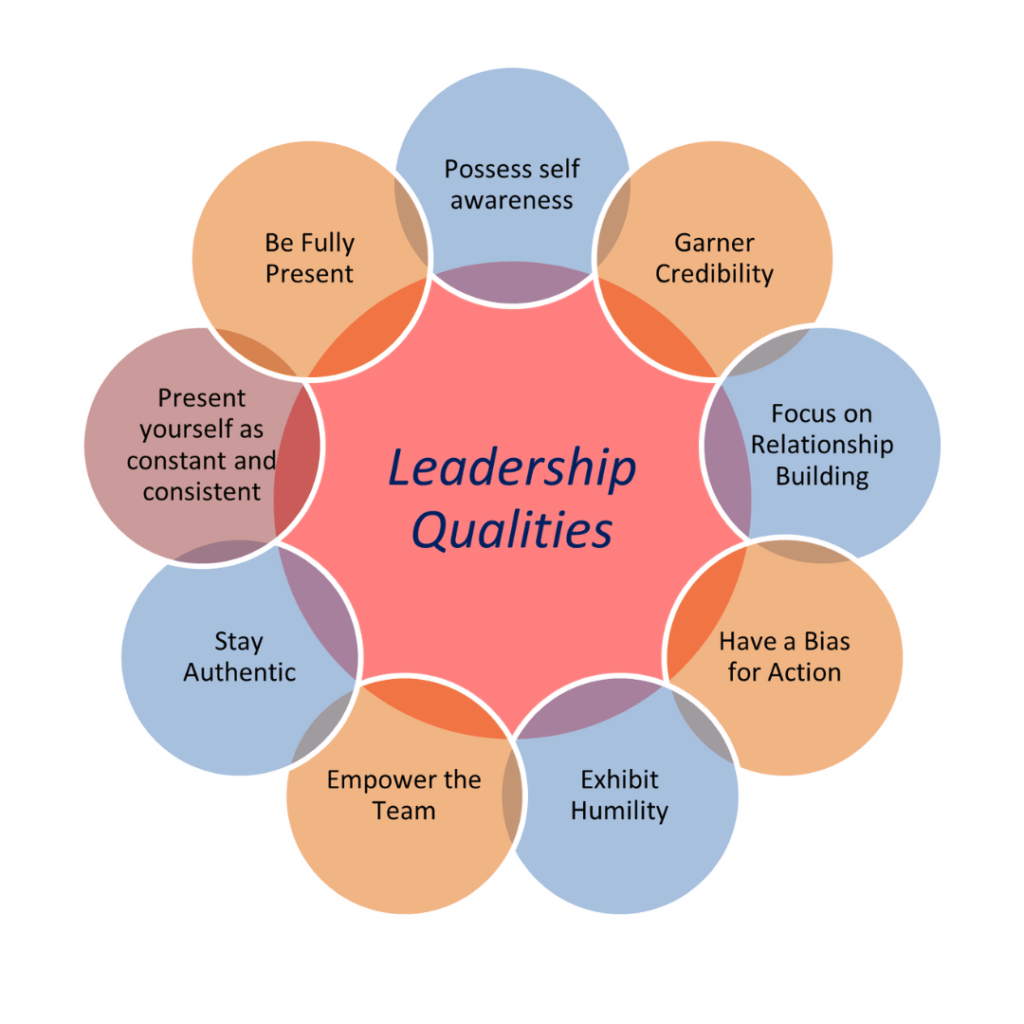Leadership is a set of behaviors used to help people align their collective direction, to execute strategic plans, and to influence and guide followers or individuals of an organization, society or team.
Purpose and Importance of Leadership
Leadership is a vital management function that helps to direct an organization’s resources for improved efficiency and the achievement of goals. Effective leaders provide clarity of purpose, guidance, inspiration and motivation to the organization to realize its goal. Leaders possess the necessary skills and knowledge to make informed decisions and solve problems effectively. Because of leadership, people come together to make things happen and to improve Organizational structure address them to Corporate Training Programs.
While there are many components of Leadership Quality, nine key elements stand out as being indispensible to develop these are as below given one by one.

Possess Self-awareness
The leader needs to be constantly aware of how they are acting, what they are saying and what message their nonverbal communication is sending. Although they may not always realize it, team members constantly observe leaders and model their actions and reactions by how they see the leader react.
Think about how you respond in situations of unexpected change or stress. Is this the way you want to respond?
Garner Credibility
Leaders gain credibility and team members’ trust by doing what they say they will do, holding themselves accountable for their words and actions, and putting the needs of the team before their own.
Gallup reports that employees who don’t trust their leaders are more likely to leave the organization than those at organizations with a high trust culture, making credibility one of the most important qualities of a good leader. When leaders are not credible, team members are not likely to trust them.
How can you demonstrate to your team that you are credible? How do you earn their trust?
Focus on Relationship Building
Good leaders have open and honest communications. Good relationships rely on good communication, whether it’s face-to-face, on the telephone or email.
Develop people skills. This means your ability to relate to others. Respect and appreciate others, Accept, support and be supportive with positiveness.
Have a Bias for Action
There are some leaders who talk a good game but never do anything other than talk. Good leaders are those who talk about what needs to happen and then do something about it or have a bias for action.
Leaders with a bias for action do not freeze in times of uncertainty or when a decision needs to be made. They courageously decide and act and hold themselves accountable for their decisions and actions. Someone has to take the first step, and these leaders are the ones taking it.
Do difficult situations or decisions cause you to freeze, or are you an action-taker?
Exhibit Humility
Humility is a word that is easily misunderstood. Individuals who have humility tend to not be overly proud of their work and accomplishments and do not believe they are better than others. In other words, humility is not thinking less of ourselves, but thinking of ourselves less and of others more. Humble leaders are not likely to take credit for others’ work. They put the needs of the team before their own, and they are strong advocates for what their team members need.
Empower the Team
A leader who empowers others unleashes their ability to act on behalf of their area of work or expertise and provides them with an opportunity to grow and improve. When a leader empowers a team member, they give them a set of guidelines to work in and then leave them alone to do their work.
Stay Authentic
Authenticity is acting in a way that represents who we truly are rather than trying to act like someone else. Leaders who act authentically show their true selves to their team members, and, over time, team members come to rely on the leader acting in certain ways.
Do you speak and act from the core of who you are, or do you try to act like someone else?

Present Yourself as Constant and Consistent
Good communication is key in a work environment, yet 18% of employers find their manager’s biggest weakness is being a bad communicator, according to The Predictive Index.
Leaders whose words and actions are similar every time enable the team to not have to wonder or worry about how the leader is going to respond. Like with authenticity, leaders who speak in a constant and consistent way almost become predictable over time. The team comes to rely on the leader’s predictability which builds trust and reduces stress in the workplace.
Be Fully Present
This one can be tough for leaders since they are often pulled in many directions at the same time. Being present for team members means that the leader is fully focused on what team members are saying, what they are doing and the work itself. Leaders who are not present are those who appear distracted by other things and do not give team members their full attention.
Conclusion
In conclusion Leadership is Critical tool for any Organization /Personnel. Organization/ Personnel should strengthen the Qualities of good leadership by addressing through Corporate Training Programs and Train the Trainers Program for team/ Personnel as well.





Leave a Reply